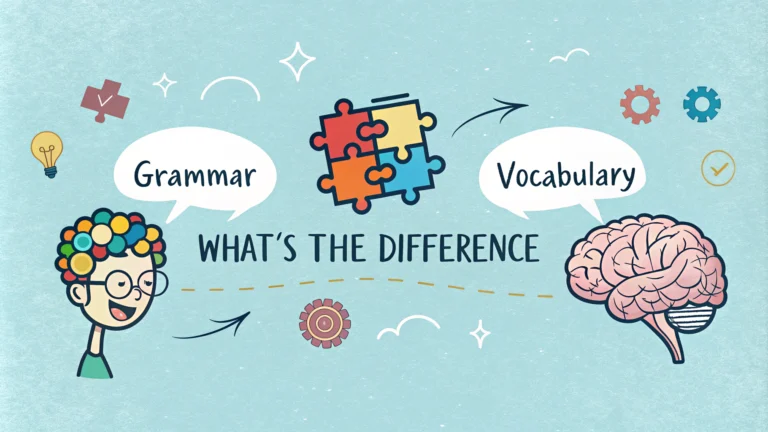Grammar and vocabulary represent two essential pillars of language learning. While vocabulary focuses on individual words and their meanings, grammar provides the rules for combining these words into meaningful sentences.
Learning a language requires mastering both components to communicate effectively. Think of vocabulary as building blocks and grammar as the blueprint for constructing sentences.
Key Differences Between Grammar and Vocabulary
- Function: Grammar structures language, vocabulary provides meaning
- Learning approach: Grammar follows rules, vocabulary requires memorization
- Application: Grammar remains consistent, vocabulary expands with usage
| Grammar | Vocabulary |
|---|---|
| Rule-based system | Word collection |
| Limited set of rules | Unlimited word possibilities |
| Changes slowly | Grows continuously |
Common Learning Challenges
- Grammar challenges:
- Complex rule structures
- Irregular patterns
- Tense applications
- Vocabulary challenges:
- Word retention
- Context understanding
- Proper usage
Effective Learning Strategies
- Grammar mastery:
- Practice with sentence patterns
- Use grammar exercises
- Study example sentences
- Vocabulary growth:
- Flashcard systems
- Context-based learning
- Regular reading practice
Tools and Resources for Language Learning
Digital learning platforms offer comprehensive solutions for both grammar and vocabulary practice:
- Grammar tools:
- Grammarly – Real-time writing feedback
- Language parsers – Sentence structure analysis
- Practice apps – Interactive exercises
- Vocabulary tools:
- Anki – Spaced repetition flashcards
- Quizlet – Word lists and games
- Dictionary apps – Context examples
Practice Methods and Exercises
Combine different learning approaches to reinforce both grammar and vocabulary:
| Practice Type | Benefits |
|---|---|
| Reading exercises | Natural context learning |
| Writing tasks | Active application |
| Speaking drills | Real-world usage |
Common Mistakes to Avoid
Watch out for these typical learning pitfalls:
- Grammar errors:
- Mixing up tenses
- Wrong word order
- Incorrect preposition usage
- Vocabulary mistakes:
- False friends between languages
- Wrong word combinations
- Incorrect register usage
Moving Forward with Language Learning
Set clear goals and track your progress:
- Create a structured study plan
- Set measurable learning targets
- Track progress with language tests
- Join language exchange groups
Remember: consistent practice and error correction lead to natural language use. Focus on one aspect at a time and build your skills gradually.
“Language learning is not about perfection, but about effective communication.”
Grammar vs Vocabulary FAQs
Q: What is the main difference between grammar and vocabulary?
Grammar refers to the rules and structure of a language, while vocabulary consists of the actual words and their meanings. Grammar shows how to construct sentences, while vocabulary provides the building blocks.
Q: Which should I learn first – grammar or vocabulary?
Start with basic vocabulary and simple grammar structures. Research shows beginners need approximately 1,000 core words to form basic sentences before focusing heavily on grammar.
Q: How many vocabulary words do I need to be fluent in English?
The average native English speaker knows 15,000-20,000 word families. For basic fluency, you need about 3,000 words for conversation and 8,000 words for reading comprehension.
Q: Can you learn a language without studying grammar?
While possible through immersion, studying grammar accelerates learning. Children learn naturally through exposure, but adults benefit from understanding language patterns and rules.
Q: What are the most common grammar mistakes in English?
Common errors include:
- Subject-verb agreement
- Incorrect article usage (a/an/the)
- Misused prepositions
- Wrong verb tenses
Q: How can I improve my vocabulary without memorizing word lists?
Effective methods include:
- Reading extensively
- Using context clues
- Learning word families
- Practicing with flashcard apps
- Watching movies with subtitles
Q: What is the fastest way to learn English grammar rules?
Focus on high-frequency structures first:
- Basic sentence patterns
- Present and past tenses
- Question formation
- Common irregular verbs
Q: Does poor grammar affect job prospects?
75% of employers report considering grammar skills when making hiring decisions, particularly for positions requiring written communication.
Q: How can I remember new vocabulary words long-term?
Use spaced repetition and create meaningful connections through:
- Personal examples
- Visual associations
- Regular review intervals
- Active usage in conversation
Q: What’s more important for business English – grammar or vocabulary?
Both are essential, but research indicates that business-specific vocabulary (approximately 2,000 words) is crucial for professional success, supported by intermediate grammar skills.



















